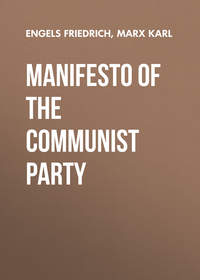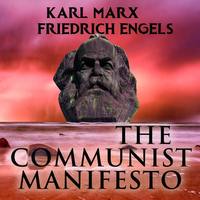 полная версия
полная версияLandmarks of Scientific Socialism: "Anti-Duehring"
The solution of this problem is the crowning glory of the work of Marx. He sheds clear daylight in economic places where the earlier socialists no less than the bourgeois economists have groped in utter darkness. From his work dates the origin of scientific socialism.
The solution is as follows. The power of increase in money which is transformed into capital cannot proceed from the money neither does it depend upon trade, since the money only realizes the price of the commodities and this price is, since we hold that only equal values are exchanged, no different from its value. On the same grounds the power of increase cannot come from the exchange of commodities. The change therefore depends upon the commodities which are exchanged, but not upon their value, since they are bought and sold at their value. It arises from their consumption-value as such; that is the change must arise out of the consumption of commodities. "In order for a commodity to derive value from consumption our possessor of money must be fortunate enough to discover a commodity whose use-value has the peculiar property of being a source of value, whose consumption would imply the expenditure of labor and thus be value-producing. And the possessor of money finds such a specific commodity on the market in the shape of labor-power." If, as we have seen, labor has no value this is by no means the case with labor-force. This has a value, as it is a commodity, and, as a matter of fact, it is a commodity to-day and this value is fixed "like that of every other commodity by the amount of labor time necessary for the production and reproduction of this specific commodity." It is fixed by the labor time which is necessary for the procuring of the means of livelihood required to maintain the laborer in a condition to continue laboring and reproduce his kind. Let us suppose that these means of livelihood represent, taking one day with another, six hours labor-time a day. Our budding capitalist who buys labor force for his business, that is hires a laborer, pays this laborer the full daily value of his labor force, if he pays him a sum of money which represents six hours of labor. If the laborer has only expended six hours in the service of the capitalist he has got the full return of his expenditure, the day's value of his labor-force has been paid. But money could not be transformed into capital in this fashion, it would have produced no surplus value. The buyer of labor-power has quite another view of the nature of his business. Since only six hours' work is necessary to maintain the laborer for twenty-four hours, it does not follow that the laborer cannot work twelve hours out of the twenty-four. The value of labor force and its realization in the labor-process are two different magnitudes. The owner of money pays out a day's value of labor-force but there belongs to him its use for the day, the whole day's labor. That the value which it produces in the course of a day is double its own value for the day is fortunate for the buyer but according to the laws of exchange no injustice to the seller. The laborer then costs the owner of money according to our calculation the value product of six hours' labor, but he gives him daily the value product of twelve hours' labor. The difference to the credit of the owner of the money is six hours' unpaid extra labor, an unpaid for surplus product, in which the labor of six hours is incorporated. The trick is done. Surplus value is produced, money is transformed into capital.
While Marx, in this way, proved how surplus value exists and the only possible way in which it can exist, under the laws which regulate the exchange of commodities he also exposed the present capitalistic methods of production and the methods of appropriation resting upon them and unveiled the secret upon which the whole arrangement of the society of to-day depends.
There is a necessary presupposition to this origin and birth of capital. "For the transformation of money into capital the money owner must first find free laborers in the market, free in the double sense that as a free person the laborer can use his labor power as a commodity, that he has no other wares to sell, that he is unemployed and that he is free of everything necessary to the realisation of his labor power." But this condition of a possessor of money or commodities on the one hand, and, on the other, of the possessor of nothing, except his own labor force, is no natural condition of affairs nor is it common to all periods of history; "it is clearly the result of a historical development, the product of a whole series of older forms of social production." And this free laborer first strikes our notice as a historical phenomenon at the end of the fifteenth and the beginning of the sixteenth century as a result of the dissolution of feudal society. Thereupon with the creation of the world trade and the world market which dates from the same period the foundation was laid for the mass of moveable wealth to become more and more transformed into capital and for the capitalistic system, directed more and more to the production of surplus value, to become the dominant system.
VIII. Capital and Surplus Value (Conclusion)(Duehring having said that the term surplus value merely signifies in ordinary language, rent, profit and interest, Engels still further explains)
We have already seen that Marx does not say that the surplus product of the industrial capitalist, of which he is the first owner, is always exchanged for its value, as Herr Duehring points out. Marx plainly says that trade profit only constitutes a portion of the surplus value and under the foregoing conditions this is only possible if the factory proprietor sells his product under value to the trader and thus parts with a portion of the booty. Marx' contention rationally put is How is surplus value transformed into its subordinate forms, profit, interest, trade-profits, ground rents etc.? and this question Marx undertakes to answer in the third volume of Capital. But since Herr Duehring cannot wait long enough for the second volume to appear he has in the meantime to take a close look at the first volume. He thereupon reads that the immanent laws of capitalistic production, the course of the development of capitalism, realise themselves as the necessary laws of competition and thus are brought to the consciousness of the individual capitalists as dominant motives. That therefore a scientific analysis of competition is only possible when the real nature of capital is grasped, just as the apparent movement of heavenly bodies can only be understood by apprehending their real movement, and not merely those movements which are perceptible to the senses. So Marx shows how a certain law, the law of value, appears under given conditions in the competitive system and makes evident its impelling force. Herr Duehring might have understood that competition plays an important role in the distribution of surplus values, and, after sufficient thought, might have grasped at least the outlines of the transformation of surplus value into its subordinate forms from the examples given in the first volume.
Herr Duehring finds competition to be the stumbling block in the way of his comprehension. He cannot understand how competing entrepreneurs can manage to sell the entire product of labor including the surplus product for so much more than the natural cost of production. Here again that "force" of his which, in his estimation, is the very evil thing, comes into play. According to Marx, the surplus product does not have any cost of production, it is the part of the product which costs the capitalist nothing. If the entrepreneurs were to sell the surplus product at its real cost of production they would have to give it away. Is it not a fact that the competing entrepreneurs really sell the product of labor every day at its natural cost of production? According to Herr Duehring the cost of production consists "in the expenditure of labor or force and therefore in the last analysis must be measured by cost of maintenance," and therefore, in present day society, is to be estimated at the cost of the raw material, instruments of labor and actual wages paid in distinction to taxation, profit and compulsory raising of prices. It is well recognised that in modern society the competing entrepreneurs do not sell their wares at the natural cost of production but calculate on a profit and generally get it. This question which Herr Duehring fancies will level the walls of Marxism as the blast of Joshua did those of Jericho is a question which the economic doctrines of Duehring have to meet also.
"Capitalistic property," he says, "has no practical value and only realises itself because it implies the exercise of indirect power over man. The testimony to the existence of this force is capitalistic profit, and the amount of this latter depends upon the extent and intensity of the power of 'force.'… Capitalistic profit is a political and social institution which manifests itself very strongly as competition. The entrepreneurs take their stand on this relation and each one of them maintains his position. A certain amount of profit is a necessity of the dominant economic condition."
We know quite well that the entrepreneurs are in a position to sell the products of labor at a cost above the natural cost of production. Surely Herr Duehring does not think so meanly of his public as to hold the position that profit on capital stands above competition as the King of Prussia used to stand above the law. The proceeding by which the King of Prussia reached his position of superiority to the law we all know, the methods by which profit has come to be mightier than competition is just what Herr Duehring has to explain and what he stubbornly refuses to explain. It is no argument when he says that the entrepreneurs trade from this position and each one of them maintains his own place. If we take him at his word, how is it possible for a number of people each to be able to trade only on certain terms and yet each one of them to keep his position? The gildmen of the Middle Ages and the French nobility of 1789 operated from a decidedly superior position, and yet they came to grief. The Prussian army at Jena occupied an advantageous position and yet it had to abandon it and surrender piecemeal. It is not enough to tell us that a certain measure of profit is a necessary concomitant of domination in the economic sphere, it is necessary to tell us why. We do not get a step further by the statement of Duehring. "Capitalistic superiority is inseparable from landlordism. A portion of the peasantry is transformed in the cities into factory hands and in the final analysis into factory material. Profit appears as another form of rent." This is a mere assertion and only repeats what should have been explained and proved. We can come to no other conclusion, then, except that Herr Duehring does not like to tackle the answer to his own question how the capitalists are in a position to sell products of labor for more than the natural cost of production, in short Herr Duehring shirks an explanation of profit. He takes the only path open to him, a short cut, and simply declares that profit is the product of "force." This has been stated by Herr Duehring in his economic theory under the statement "force distributes." That is all very well; but the question still persists what does force distribute? There must be something to distribute otherwise force cannot distribute it. The profit which the competing capitalists pocket is something actual and tangible. Force may take but it cannot create. And if Herr Duehring still obstinately persists in his statement that "force" takes the profits for the entrepreneurs he is as silent as the grave as to whence it takes it. Where there is nothing the Kaiser, as all other "force," ceases to operate. From nothing comes nothing, particularly nothing in the shape of profits. If capitalistic private property has not practical actuality, and cannot realize itself, except by the exercise of indirect force over men, the question still persists, in the first place, how did the capitalist government come into possession of this "force" and in the second place how has this force been transformed into profits, and in the third place where does it get these profits?
(The remainder of this section is merely further elaboration of this idea with more caustic satire at the expense of the antagonist of Engels.)
IX. Natural Economic Laws – Ground Rent(In this chapter Engels proceeds to examine what Herr Duehring called the "fundamental laws" of his theory of economic science.)
Law No. I. "The productivity of economic instruments, natural resources and human force are capable of being increased by invention and discovery."
We are amazed. Herr Duehring treats us like that joke of Moliere on the parvenu who was informed that he had talked prose all his life without being aware of it. That inventions and discoveries increase the productive force of labor in many cases (but in many cases not, as the patent records everywhere show) we have been for a long time aware.
Law No. II. "Division of Labor. The formation of branches of work and the splitting up of activities increases the productivity of labor."
As far as this is true it is a mere commonplace since the time of Adam Smith. How far it is true will appear in the third division of this work.
Law No. III. "Distance and transportation are the most important causes of the advance or hindrance of the organization of productive forces."
Law No. IV. "The industrial state has incomparably greater capacity for population than the agricultural state."
Law No. V. "In economics only material interests count."
These are the natural laws on which Herr Duehring founds his new economics. He remains true to his philosophic methods.
(Hereupon Engels proceeds to the discussion of Duehring's opinions on ground-rent.)
Herr Duehring defines ground-rent as "that income which the landowner as such derives from ground and land." The economic idea of ground-rent, which Herr Duehring undertakes to explain to us, is transformed right away into the juristic concept so that we are no further than at first. He compares the leasing of a piece of land with the loan of capital to an entrepreneur but finds, as is so often the case, that the comparison will not hold. Then he says "to pursue the analogy the profit which remains to the lessee after the payment of ground-rent, answers to that portion of the profit on capital which remains to the entrepreneur who operates with borrowed capital after the interest on the borrowed capital has been paid."
(To these arguments Engels replies:)
The theory of ground-rent is a special English economic matter, and this of necessity because only in England does a mode of production exist by which rent is separated from profit and interest. In England there prevail the greater landlordism and the greater agriculture. The individual landlords lease their lands in great farms to lessees who are able to cultivate them in a capitalistic fashion and do not, like our peasants, work with their own hands, but employ laborers just like capitalistic entrepreneurs. We have here then the three classes of bourgeois society, and the income which each receives – the private landlord in the form of ground-rent, the capitalist in that of profit and the laborer in the form of wages. No English economist has ever regarded the profit of the lessee as Herr Duehring does and still less would he have to explain that the profit of the lessee is what it indubitably is, profit on capital. In England there is no use to discuss this question for the question as well as its answer are obvious from the facts and, since the time of Adam Smith, there has been no doubt at all about it.
The case in which the lessee cultivates his own land, as the rule in Germany, for the profit of the ground landlord does not make any difference in this respect. If the landlord cultivates the land for his own profit and furnishes the capital he puts the profit on capital in his pocket as well as the ground-rent for it cannot be otherwise under existing conditions. And if Herr Duehring thinks that rent is something different when the lessee cultivates the land for himself it is not so and only shows his ignorance of the matter.
For example: —
"The revenue derived from labor is called wages; that derived from stock by the person who manages or employs it is called profit. The revenue which proceeds from land is called rent and belongs altogether to the landlord. The revenue of the farmer is derived partly from his labor and partly from his stock… When those three different sorts of labor belong to different persons they are readily distinguished, but when they belong to the same they are sometimes confounded with one another at least in common language. A gentleman who farms part of his own estate, after paying the expenses of cultivation, should gain both the rent of the landlord and the profit of the farmer. He is apt to denominate, however, his whole gain, profit, and thus confounds rent with profit, at least in common language. The greater part of our North American and West Indian planters are in this situation. They farm, the greater part of them, their own estates, and accordingly we seldom hear of the rent of a plantation but frequently of its profit… A gardener who cultivates his own garden with his own hands, unites in his own person the three different characters of landlord, farmer, and laborer. His produce, therefore, should pay him the rent of the first, the profit of the second and the wages of the third. The whole, however, is commonly considered as the wages of his labor. Both rent and profit are in this case confounded with wages."
This passage is in the sixth chapter of the first book of Adam Smith. The case of the landholder who tills his own land has been examined a hundred years ago and the doubts which perplex Herr Duehring so much are caused entirely by his own ignorance.
X. With Respect to the "Critical History"This which is the concluding portion of the Second Division of the work and which deals with Herr Duehring's estimates of economic writers is omitted as being of too limited and polemic a character for general interest.
PART III
CHAPTER IX
SOCIALISM
The first two chapters of this Division, which deal respectively with the historical and the theoretical sides of Socialism, are omitted. They have been already translated. The well known pamphlet "Socialism, Utopian and Scientific" contains both of them. The second has also been translated by R.C.K. Ensor and published in his "Modern Socialism."
ProductionFor him (Herr Duehring) socialism is by no means a necessary product of economic development, and, still less, a development of the purely economic conditions of the present day. He knows better than that. His socialism is a final truth of the last instance, it is "the natural system of society." He finds its root in a "universal system of justice." And if he cannot take notice of the existing conditions which are the product of the sinful history of man up to the present time in order to improve them that is so much the worse, we must look upon it as a misfortune for the true principles of justice. Herr Duehring forms his socialism as he does everything else on the basis of his two famous men. Instead of these two marionnetes, as heretofore, playing the game of lord and slave they are converted to that of equality and justice and the Duehring socialism is already founded.
Clearly in the view of Herr Duehring the periodic industrial crises have by no means the same significance as we must attribute to them. According to Herr Duehring they are only occasional departures from normality and furnish a splendid motive for the institution of a properly regulated system.
(Duehring attributes crises to underconsumption; to which Engels replies:)
It is unfortunately true that the underconsumption of the masses and the limitation of the expenditures of the great majority to the necessities of life and the reproduction thereof is not by any means a new phenomenon. It has existed as long as the appropriating and the plundered classes have existed. Even in those historic periods where the condition of the masses was exceptionally prosperous, as in England in the fifteenth century, there was underconsumption; men were very far from having their entire yearly product at their own disposal. Although underconsumption has been a constant historical phenomenon for a thousand years, the general break down in trade, due to overproduction, has appeared, for the first time, within the last fifteen years. Yet the vulgar political economy of Herr Duehring attempts to explain the new phenomenon, not by means of the new factor of overproduction, but by means of the exceedingly old factor of underconsumption. It is just as if one were to try and explain a change in the relation of two mathematical quantities, one of which is constant and the other variable, not from the fact that the variable quantity has varied, but that the constant has remained constant. The underconsumption of the masses is a necessary condition of all forms of society in which robbers and robbed exist, and therefore of the capitalist system. But it is the capitalist system which first brings about the economic crisis. Underconsumption is a prerequisite of crises and plays a very conspicuous role in them, but it has no more to do with the economic crisis of the present day than it had with the former absence of such crises.
In every society in which production has developed naturally, to which class that of to-day belongs, the producers do not master the means of production but the means of production dominate the producers.
In such a society every new leverage of production is converted into a new means of subduing the producers beneath the means of production. This was the cause of that instrument of production, the mightiest up to the time of the introduction of the greater industry, the division of labor. The first great division of labor, the separation of the city and country, doomed the inhabitants of the rural districts to a thousand years of stupidity and the people of the towns to be the slaves of their own handiwork. It denied the chance of intellectual development to the one and of physical development to the other. If the peasant had his land and the town dweller his handiwork, it is just as true to say that the land had the peasant and the handiwork the townsman. As far as there was a division of labor there was also a division of man. The rise of one single fact slaughtered all former intellectual and bodily capacities. This annexation of man grew in proportion as the division of labor developed and reached its culmination in manufacture. Manufacture distributes production into its separate operations, makes one of these operations the function of the individual worker, and imprisons the worker for his whole life to a given function and to a given tool. "It forces the workingman to become an abnormality, since it makes him concentrate his efforts on detail at the expense of the sacrifice of a world of forces and capacities… The individual himself becomes subdivided, he is transformed into the automatic tool of the division of labor" (Marx). This tool in many cases finds its perfection in the literal crippling of the worker, body and soul. The machinery of the greater industry degrades the workingman from a machine to being the mere appendage of a machine. "From the lifelong specialization of looking after a machine there comes the lifelong specialization of serving a part of a machine. The abuse of machinery transforms the worker from childhood into a portion of a part of a machine" (Marx). And not only the workingman but the classes which indirectly or directly plunder the workingman are also themselves involved in the division of labor and become the slaves of their own tools. The spiritually-barren bourgeois is the slave of his own capital and his own profit-getting, the jurist is dominated by his ossified notions of justice which rule him as a self-contained force; the "refined classes" are dominated by the local limitations and prejudices, by their own physical and spiritual astigmatism, by their specialised education and their lifelong bondage to this specialty, even though the specialty be doing nothing.
The Utopists were thoroughly aware of the effects of the division of labor, of the effect on the one hand of crippling the worker and on the other of crippling the work, the unavoidable result of the lifelong, monotonous repetition of one and the same act. The rise of the antagonism between town and country was regarded by Fourier as well as Owen as the beginning of the rise of the old division of labor. According to both of them the population should be divided into groups of from six hundred to three thousand each, distributed over the country. Each group has an enormous house in the midst of its territory and the housekeeping is done in common. Fourier occasionally speaks of towns but these only consist of four or five of the big communal houses in close proximity to each other. By both of them the work of society is divided into agriculture and industry. According to Fourier, handwork and machine manufacture were both included in the latter while Owen made the great industry play the most important part, and the steam engine and machinery performed the work of the community. But both in agriculture and manufacture the two writers named gave the greatest possible variety of occupation to individuals, and accordingly the education of the young provided for the most universal technical training. Both of them think that there will be a universal development of the human race as a result of a universal practical participation in practical work, and that work will recover its old attractiveness, which has been lost as a result of the division of labor, by virtue of this variety and the shortening of the time expended upon it.






